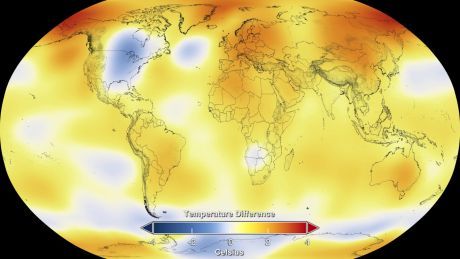News
You are here
It’s getting hot in here: 2014 was the warmest year on record

February 2, 2015
It’s not news to anyone that the planet is heating up, but clear, quantifiable data can be hard to come by in the controversial cross-fire around climate change. More and more scientific organizations have put forth the “yes, it’s actually happening” sort of data, and it has our attention.
NASA, The National Climatic Data Centre at NOAA, and the Japan Meteorological Agency all agree that 2014 has had the highest global average temperature in the 135 years we have kept records. John Grunsfeld, associate administrator for the Science Mission Directorate at NASA said of the data, "The ranking of 2014 as the warmest year on record reinforces the importance of... understand the role and impacts of human activity (on climate change)." Nine of the 10 warmest years on record, have occurred since 1998. Since 1880, Earth’s average surface temperature has warmed by about 0.8 degrees Celsius and the majority of that warming has occurred in the past three decades.
We have seen evidence of climate change before, in the form of droughts, (un)natural disasters, and rising global temperature trends, never mind the basic science behind greenhouse gasses. So why is this recent development so important? "This is the latest in a series of warm years, in a series of warm decades. While the ranking of individual years can be affected by chaotic weather patterns, the long-term trends are attributable to drivers of climate change that right now are dominated by human emissions of greenhouse gases," said Gavin Schmidt, director NASA's Goddard Institute for Space Studies. But how have we let it get this far when we have long known about climate change?
There is a popular argument given in the title of Harvard professor Cass R. Sunstein’s article, “People Don’t Fear Climate Change Enough.” David Suzuki summarizes it beautifully, “People look to readily available examples when assessing danger, focus ‘on risks and hazards that have an identifiable perpetrator,’ and pay more attention to immediate threats than long-term ones.” In other words, humankind is procrastinating on a global scale.
However millions have marched in the streets to demand action on climate change. The real reason for the lack of action is that dealing with climate change is a threat to profits and capitalism. Capitalism is innately exploitative. This includes not only the workers, but also natural resources like oil and gas deposits, mineral deposits, forests, and wildlife. The key to stopping climate change is intertwined with stopping capitalism. The ecological economist Herman Daly advocates the importance of protecting what he calls, natural capital: natural resources that have lucrative potential. The raw materials for production must be respected and all economic pursuits must be approached with sustainability, not profitability, at their forefronts. Principles like taking no more than we need, and allowing resources to replenish before extracting them again are integral to protecting natural capital. These and other socialist principles of making decisions democratically and to the most benefit of the people would result in the protection of our environment.
The bottom line: capitalism is the perpetrator, the people are the victims, and the outcomes of inaction are currently threatening humanity. Let’s act now by supporting socialist, climate justice movements.
Section:
Topics:









